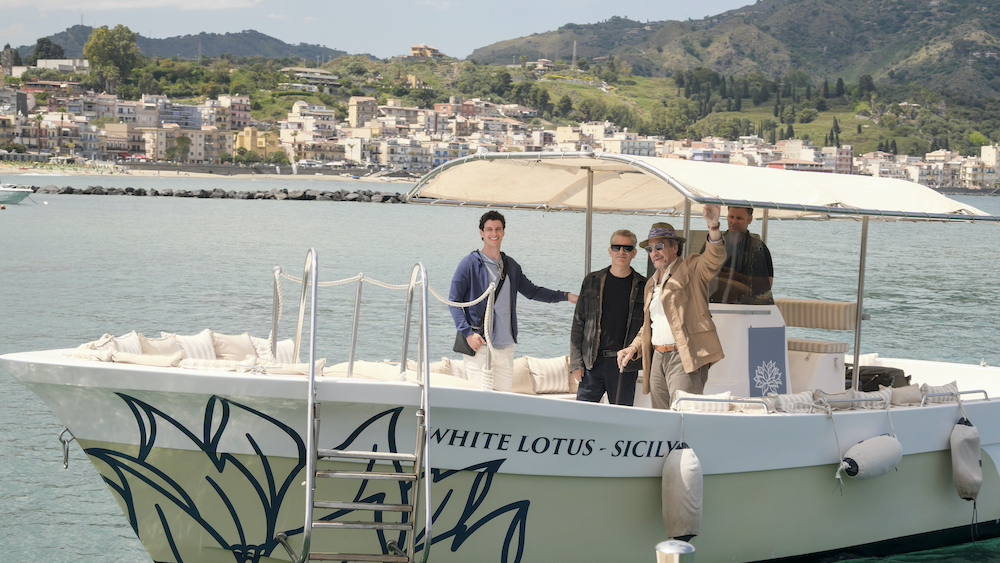
The world of The White Lotus is all about location, location, location. In season two of the Emmy-award-winning HBO series, creator Mike White journeys to Italy with his cast and crew for another whodunit mystery. This time the action takes place among the gorgeous backdrop of the sun-drenched beaches and cascading mountains of Sicily.
To accompany the lavish and sometimes sinister scenes, White wanted authentic Italian music. Music supervisor Gabe Hilfer (Crazy Rich Asians) was brought on board to facilitate the Italian playlist. It would prove to be a gigantesco feat, if you will, considering Hilfer admittedly had Italian music knowledge but could not speak a lick of the language. What he did have was an endless enthusiasm, submerging himself in any Italian music resources he could find and sometimes reaching out to publishers in Italy who thought they were being pranked by this American asking for music rights.
Below the Line spoke with Gabe Hilfer, who spoke about how his background working for record labels prepared him for the multitude of responsibilities that are involved in music supervision. For The White Lotus, Hilfer took deep rabbit hole dives through Italian music history, and a stunning repertoire of Italian compositions emerged, now on Spotify.
[Note: This interview has been edited for clarity and length]

Below The Line: How’d you get your start in the industry?
Gabe Hilfer: I worked in the music business in New York in the late nineties and my early twenties at a record company. I was doing some artist management, and I bounced around at a couple different record labels and ended up working with Mark Ronson and Rich Kleiman at a little imprint they had called Allido Records.
BTL: How did you transition into music supervision for film and television?
Hilfer: In that time, probably 2003 or 2004, I just haphazardly fell into helping license music and supervising the music for a couple of reality TV shows that were getting produced out of New York. That snowballed into an indie film. I met up with somebody who was doing a lot of movies, and he kind of mentored me, and that just elevated things. I was doing a lot of indie films. I did The Wrestler and Black Swan. I moved to Los Angeles in 2007, and from there I started working on more films, some TV shows, and things like that.
BTL: I’ve interviewed other music supervisors, and like you, they got their start working at a label. That’s probably a really good way to go because you build connections.
Hilfer: There are a lot of ways to define it. I think music supervision is a little bit mysterious. To the outside world, it seems sexy, like you pick all the songs and I’m just some man about town who finds cool music and puts it in a TV show. I don’t want to dispel that myth because I’m living off it right now. (laughs) But that’s only partially true. I think a lot of it is that you’re the conduit between the production and the music business. Much of it is knowing who the resources are to get the music you need to solve the issues. I look at myself personally as a sort of music problem solver.

BTL: How would you describe problem solving for the music of The White Lotus?
Hilfer: Sometimes projects want you to help them find the greatest composer. I mean, we had a great composer Cristobal Tapia de Veer already, so that wasn’t needed, but it’s finding amazing songs from Italy and vintage songs from Italy. Then how do we not only find those creatively, but also get the rights that we need for them? How do we track down the people who own that music? And how do we do all of the things that creatively work and fulfill the vision of the great Mike White while still staying on the right side of the law and doing everything the way you’re supposed to do it so that everything is buttoned up.
I think it’s a lot of left brain, right brain, logistics, and understanding the music business. To your original point, I think it’s a really good baseline for how things work and the record label system, music, publishing—all that’s really important. Having relationships within the community with management and agents and being able to solve every problem
BTL: Let’s go back in time a bit. How did you begin with The White Lotus?
Hilfer: I didn’t do season one. The music supervisor for season one was Janet Lopez, who is a genius and a friend. She took a job in-house at a company in between seasons one and two, so she was unavailable for season two. Part of your job when you join any show in season two is to just don’t fuck it up. (laughs) Because if it’s already good, you’d be really not a great person if the whole thing went to shit and it was your fault. So I came in with that idea, and then I got all the scripts. They were all written ahead of time.
The first thing you want to do in any situation is see what is needed for production. So the things that were needed for production in this particular show were all the on-camera performances. If you think back, there’s the piano player in the hotel, Giuseppe; we had to figure out what he was going to be playing. Would we record it ahead of time?
Beatrice Granno, who then comes, does her thing, and takes over for Giuseppe, and she’s supposed to be really good. And she is super talented, an incredible singer, so figuring out how we would handle all of those things ahead of time so that they would seamlessly shoot on the days of production That was the first challenge.
I worked very directly with Mike and with Dave Bernad his producing partner, figuring out what those songs would be. Could we afford them? Which ones were important, which ones were more background, which ones would be featured, which ones we wanted to sink our teeth into and have them have extra meaning, and which ones were meant to be a little bit more traditional songs that a lounge singer would play?
BTL: Did you know anything about Italian music going into this project?
Hilfer: I’ll tell you a funny story. My parents watched The White Lotus. They called me right after, and they were like, “We had no idea that you knew this much about Italian music! We raised you, and we did not know that this was your expertise.” That is kind of the coolest part about my job: it was not my expertise before this, but you have to immerse yourself and just dive in and learn it and figure out, “All right, I’m going to be working on a show that’s almost exclusively Italian music, and who are my resources?” What can I read that’s going to inform me? What secret playlists do Spotify have stashed up their sleeve that I can expose myself to—things that I wouldn’t necessarily have heard before.
BTL: So tell me what some of those resources were, and where did you tap into finding these songs?
Hilfer: Some of them, like an editor, would say, “Hey, I found this cool song; what do you think?” I’d say, “Oh my God, this is amazing, and let’s see if we can license it.” Then if it’s working, you ask, “What other things are like this?” A great collaborator of mine once said, “Know what you know and what you don’t know, and don’t be afraid to ask for help.” So in situations like this, I scoured the music community to see who had the best resources in terms of Italian music and Italian publishers who worked with Italian writers. I talked to every single person I could in that world.
I reached out to anybody who had any affiliation with cool Italian music, and I was like, “Send me everything you have. ” I went through a lot of songs. Then I’d go back and forth with the editor, who didn’t necessarily agree with me every time. It was a spirited back and forth, like, what do you think about this for the scene? And they’re like, “No, what about this?” And I was like, “Cool, but what if we’re never going to get that song?” It’s a cliched thing to say, but it’s almost like the process is the magic—figuring it out, the conversations, managing the budget, dealing with the licenses.

BTL: What other challenges did you face licensing Italian music?
Hilfer: One of the things that we do is handle all the rights and clearances for the music, including a lot of the vintage Italian music. That was one of the big challenges of this show, which was songs that were written in the 1960s. Many of the authors have passed away, and so you’re finding their heirs or who inherited the ownership of this percentage of a song and tracking them down. I was hung up on a lot on this show. I was hung up on at least a dozen times by people because of the language barrier.
BTL: After finally getting these Italian connections, which needle drop was the most difficult to acquire?
Hilfer: I would say my most challenging needle drop was “Ogni Uno” by Eugenio Bennato in episode five. It’s when Tanya (Jennifer Coolidge) is on the boat with the gay guys on the way to their villa, and it’s sort of an establishing shot. I think the song might have originally been written for a movie in the 1970s. There are four publishers on it: one is in the United States, the other three are Italian, and one of them is a movie company, which has told me 20 times that they are a movie company. They had nothing to do with music until I wore them down. Finally, they looked through some old contracts and were like, “Oh wait, we do own like 15% of this song!” It took a solid month and a half to figure out who owned what parts of the song.
We get it done, I think seriously, on the absolute last possible day we could have put it into the show. Honestly, weirdly, I’ve listened to that song to this day. I put it on every so often because it’s such a fun, well-made song that builds and has this sincerity to it. I love every bit of it, and it was so hard.
The irony, of course, about just the job in general is that you put in hours and hours of research and time trying to get all the stuff, and then it plays on screen for 20, 30, or 40 seconds. Aesthetically, with the tone and the show, I couldn’t be more proud of everything that we did for it.
BTL: Would you consider yourself an Italian music aficionado after all that?
Hilfer: I don’t want to speak out of turn, but I will say that it feels like after The White Lotus came out last year, there was a lot of interest in Italian music. I get pitched music from every record company and publishing company in town because they want to get their music featured in movies and TV shows. But when this show came out and people were talking about it, within three or four months, I was getting so many blasts, not specifically to me but just in general about Italian music playlists and vintage Italian music. In my head, I definitely think the two things are correlated, so there was a renewed interest in vintage Italian music from the American audience.

BTL: Are you already looking into the music for season three?
Hilfer: They asked me if I’d work on it, and I said 100 percent I would. I love those guys. The whole team, the process, and the whole thing have just been mind-blowing. It’s not often. The two things that I find most important when working on a show are that the people are good people. You know that inevitably you’ll get into high-pressure situations with timelines running out, budget concerns, and everyone freaking out about whatever is inevitable in every show at some point. So, if people are nice and understand what you’re doing, everyone’s working hard towards the same goal, and everyone treats you with respect and dignity, that’s important. I would do a show just for that, but then when the show comes out and is fantastic, that’s a rarefied unicorn-level situation. And this is that kind of project. So, I would work with these guys a million times in a row. I think all those plans have been put on pause until the writer’s strike situation resolves itself.
BTL: Any idea what style of music you’re gonna have to go down the rabbit hole for this time?
Hilfer: I believe it’s publicly known that it’s Southeast Asia. I don’t know if it’s specifically been talked about or definitively said that it is in this country, but I think that we will be going down the path of Asian music. I did Crazy Rich Asians, so I can go back and look through all those contacts, too, and make sure that I’m still in touch with those incredible people who helped put all that music together with me. I might even be starting on first base with that one.
BTL: Looking back on all your hard work with The White Lotus, what are you most proud of?
Hilfer: With Italy, I was like, “What is happening?” I needed to learn, but it’s fun. I mean, that’s the challenge. I would never say that these are the easiest projects because they make you learn and it’s hard work, but they are the most rewarding. The creative is like when the Titanic hit an iceberg; there wasn’t much visibility, and then there was like six miles of iceberg under the surface; that’s the amount of work that went into it.
When we were dealing with Italy, first for production, and Hawaii for post-production [where Mike White lives], doing all of that meant meeting incredible people that I had not had the opportunity to work with before, and then the product came out, and not only was it great, humbly speaking, but it was so well-received. There’ve been things I’ve worked on that I thought were fantastic, and just through whatever circumstance I have no control over, maybe a lot of people don’t see them, or maybe they just don’t become the talk of the town for whatever particular reason.
BTL: I think you need to go back to Italy, Gabe.
Hilfer: (laughs) I’ve been a few times, but I do need to seriously go again. I need to go buy a couple dinners and bottles of wine for the people who helped me out on the ground in Italy, for sure. In the meantime, it’s funny you say that because three, four, or five different people I know that are going to Italy this summer. All of them have asked me if I could send them the playlist so that they could immerse themselves in the music on the plane ride over there. There were people I went to high school with that I haven’t talked to in years, hitting me up. They’re all feeling the need to compliment you on it, which is just a flattering and amazing feeling.
White Lotus season three is now available to stream on Max.





